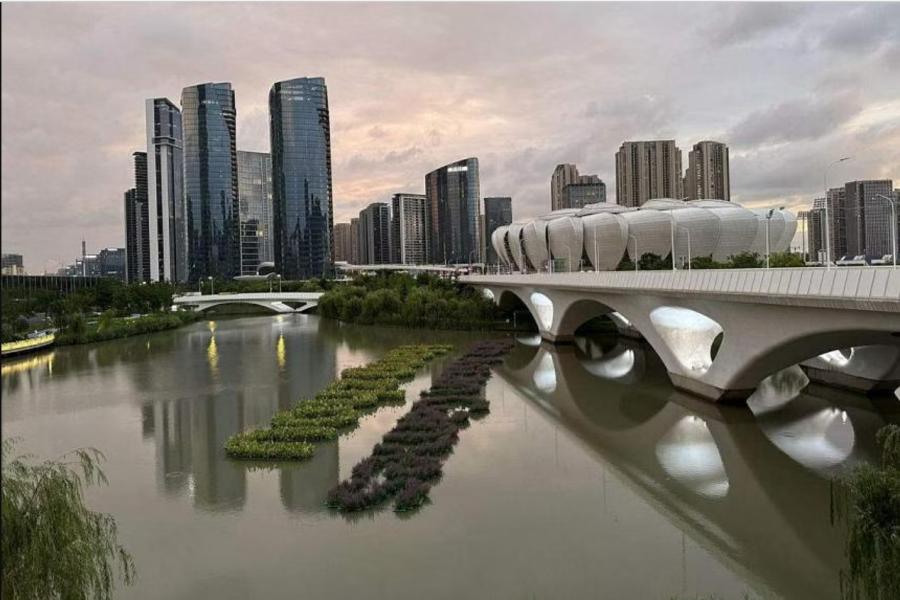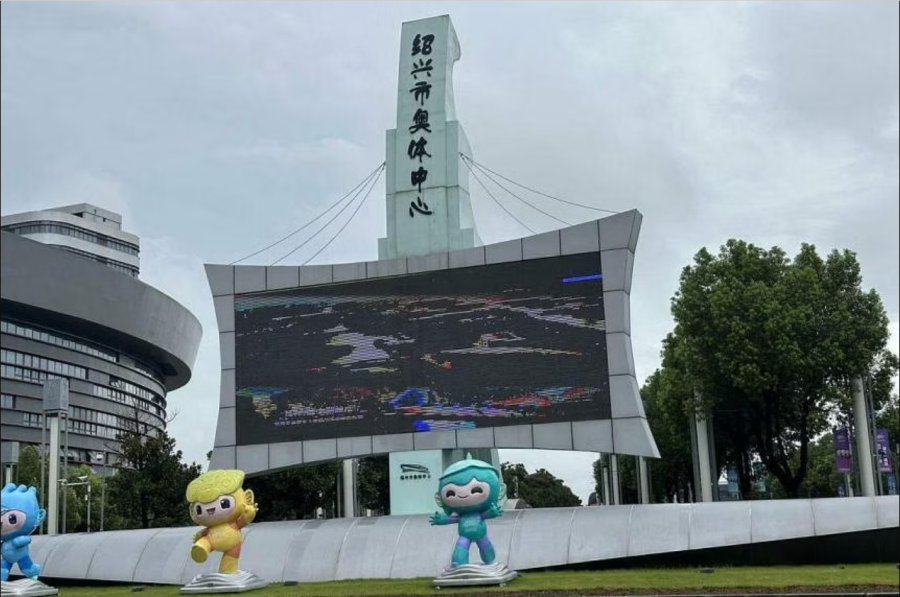July 31, 2023
SHAOXING, Zhejiang – Bags of seeds to plant outside buildings. English phrase books. Coordinated T-shirts for taxi drivers.
In Hangzhou, the historical city best known for being home to tech giant Alibaba, the government has been earnestly gearing up to host the Asian Games, which will see some 12,500 athletes descend on the city, along with tens of thousands more officials, support staff and spectators.
As preparations for the Games go into the final stretch, local merchants are hoping that it will give an additional boost to the local economy, which has been hit hard by nearly three years of some of the country’s strictest Covid-19 pandemic restrictions.
Running from Sept 28 to Oct 8, the Games will largely be hosted in historic Hangzhou city but will also feature other venues in five neighbouring cities including Shaoxing, Ningbo and Jinhua, all located in Zhejiang province.
The event had been delayed by a year because of China’s stringent pandemic policy, which until late 2022 had required lengthy quarantine for anyone entering the country.
Hotels in Hangzhou expect to be in high demand, with the Games also coinciding with the Mid-Autumn Festival and Golden Week holiday in October.
A quick check showed that most three-star hotel rooms are already going for close to 800 yuan (S$150) a night as Games organisers warned last Thursday that accommodation could quickly run out.
In downtown Hangzhou, close to West Lake, a popular tourist attraction, mascots Chenchen, Congcong and Lianlian can be seen at nearly every turn – hanging on banners on lamp posts, on the sides of buildings, and behind glass displays in shops selling Asian Games merchandise.
While the city has begun putting up a lot of decorations, local businesses in the area have not been told much about what to expect, said cafe manager Casey Chen.
“We’ve been given stickers in English that say ‘Alipay accepted here’, but I think those are from the payment merchant,” she told The Straits Times.
“We’re used to foreigners anyway since our shop is close to a tourist attraction, but since we’re quite far from the sports venues, whether the spectators will end up coming to visit our shop is a different issue.”
On a rainy Friday morning, about half a dozen people were waiting outside the main Asian Games merchandise shop, waiting for the doors to open.
Among them was tourist Chen Siya and her eight-year-old son Stanley. The pair were visiting from Xi’an and wanted to buy some souvenirs for friends back home.
“My son wanted some of the collectibles for his friends so we got a few notebooks, which are more practical than a plushie or collectible figurine,” she said.
Merchandise range from T-shirts and pins to first-day cover stamps, costing between 58 yuan and 99 yuan, to more luxe items such as porcelain cups and even tea leaves.
A set of two 50g canisters of Chintong Black Tea, a local speciality, packed in a special presentation box retailed for 1,000 yuan, while a hand-painted porcelain vase featuring scenes of West Lake was going for 69,800 yuan.

Local merchants are hoping that the Games will give an additional boost to the local economy. ST PHOTO: ELIZABETH LAW
A shop assistant, who wanted to be known only by her surname Xiao, said business has been brisk, with hundreds of purchases each day.
“Most of our customers are either visitors who want something to take home, or locals who want to buy a gift for people they’re visiting outside Hangzhou,” she said. Merchandise retail figures were not immediately available.
Across the city, several other local businesses have been designated official merchandise shops, including silk bedding and clothing chain Hangzhou HSDP Group, which has a glass counter displaying Asian Games-branded thermos, tea sets and plushies next to bedding accessories.
According to posts on social media platform Xiaohongshu, residents in some districts had earlier been given seeds to grow plants outside their homes in a bid to beautify the city, while some government departments have handed out booklets with basic English phrases for giving directions.
Meanwhile, taxi drivers have been told that during the Games, they will have to wear coordinated outfits provided by their companies.
Driver Wang Zhonghua, 50, said: “Even though we’re not the official transport provider for the events, our company said they want us to look professional and consistent, so they will be giving out the T-shirts closer to the start of the Games.”

The government in Hangzhou has been earnestly gearing up to host the Games. ST PHOTO: ELIZABETH LAW
In neighbouring Shaoxing, which is hosting baseball, sports climbing, basketball and volleyball competitions, preparations appear slightly more muted.
Final renovations are still under way at the imposing Shaoxing Olympic Sports Centre, which will host the basketball competition, with workers renovating several ground-floor rooms.
Several students, who had been using the centre’s badminton courts, said they hope to get tickets to watch the competitions.
While the purchase of tickets is open for registration and will be under a balloting system, there have been several ticket scams, prompting a crackdown by the local authorities.

Final renovations are still under way at the imposing Shaoxing Olympic Sports Centre. ST PHOTO: ELIZABETH LAW
At Yellow Wine Town, a historic wine-making facility in Shaoxing’s Dongpu district that has been converted into a tourist attraction, there were statues of the Asian Games mascots at the entrance, but its staff appeared to be unaware – or did not seem to care – that the Games are coming soon.
A security officer at the entrance, who gave his surname as Huang, said: “Most people who come here want to look at our historical and cultural offerings. We have decorations for the Games only because the local government put them here.”
Farther in town, merchants appeared to be a bit more optimistic about potential business opportunities.
Convenience store owner Liang Qiuxia said: “There have been fewer tourists in the past few years so any activity at all will be helpful for us. If not, it would be very hard to continue our business.
“Hopefully, more foreigners will come here, and they can get a taste of our traditional Shaoxing hospitality.”


